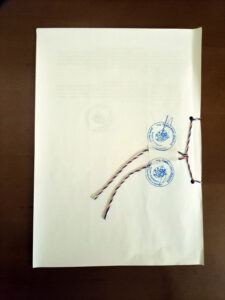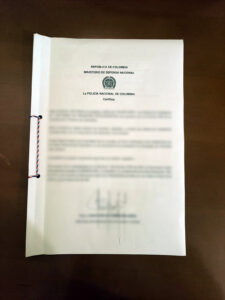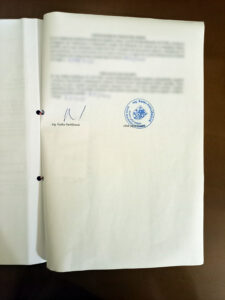Frequently asked questions on Spanish translations and Interpreting
An apostille is the so-called final verification clause which will enable you to use a document issued in the Czech Republic abroad. An apostille is issued and acknowledged by the states that are signatories to the Convention on the Abolition of the Requirement of Verification of Foreign Authentic Instruments, adopted in the Hague on 5 October 1961 (Convention de La Haye du 5 Octobre 1961), to which the clause, always with the header
APOSTILLE, refers. The practical significance is that a public document issued by a judicial or administrative authority of a Contracting State is accepted without further verification as a public document also in the states that are signatories to the Convention (nowadays more than 90 countries across the world).
Super legalization or higher authentication of documents is the verification of a public document in order that it could be used abroad in case that the receiving country is not the signatory to the Convention on the Abolition of the Requirement of Verification of Foreign Authentic Instruments, adopted in the Hague on 5 October 1961.
Depending on the document type, for which the apostille is needed, it is necessary to approach the agency authorized to issue apostilles or super legalizations clauses. In case of matrimonial documents and criminal records, the authorized body is the Ministry of the Foreign Affairs of the Czech Republic.
https://www.mzv.cz/jnp/cz/cestujeme/overovani_listin/
In case of documents issued or authorized by notaries, the authorized body is the Notarial Chamber of the Czech Republic, in its seat and in all the regional notarial chambers.
https://www.justice.cz/web/msp/overovani-listin-do-ciziny1; https://www.nkcr.cz/apostila
Some states or their offices require the apostille not only for the original document but also for the official translation. In this case, the translators signature and stamp must be authenticated by the notary, and this notarial authentication must also be amended
with the apostille. This apostille needn’t be translated. Should you live far from Prague, or want to save time, I may arrange for a reasonable fee the apostille or super legalization of
your document or of its translation on your behalf
When an authority requires legal, official, verified or court translation (which are synonyms for the same translation service), it means that the translation must be made by a person registered as court (official) translator/interpreter by the Czech Ministry of Justice, who will amend the translation with his or her translator’s clause with his or her official stamp, confirming that the text corresponds to the text of the translated document.
To avoid doubts as to which document is translated, the source document, provided by the client as an original, authorized copy or normal scan (dependent on the authority requirement), must be bonded together with the translation and the stamped translator’s clause to form an inseparable unit.
The Court Spanish translator will attach to the original document or its verified copy to the translation and the translator’s clause. In the clause he or she declares that the translated text is equivalent to the original, and amends it with the official stamp, available only to the translators registered with the Ministry of Justice.
This is how verified document looks like:




